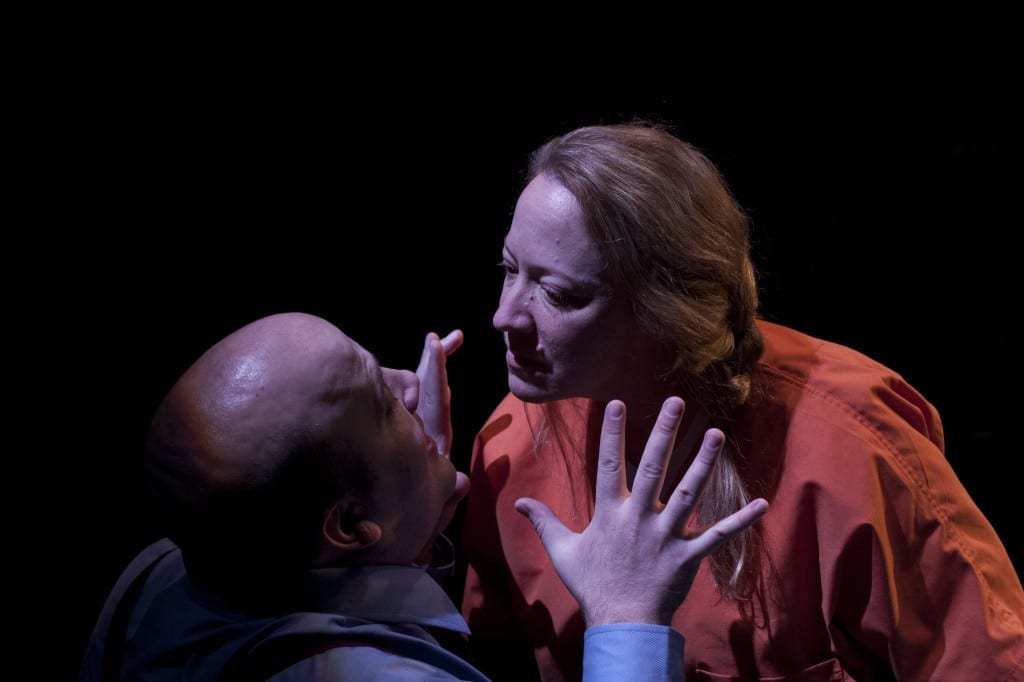SALT LAKE CITY — Heavy metal music blasts overhead while Susan paces the floor in soft circles. The music is cut by the occasional ringing of alarms pulsing. Susan stops, covers her ears, and waits. The heavy metal starts again and she continues to pace.

Eric Samuelsen’s Nothing Personal premieres at Plan-B Theatre Company this week. Influenced by the persecution and imprisonment of Susan McDougal for her refusal to lie before the Kenneth Starr grand jury, Samuelsen’s script builds on that start and continues to explore the question of truth, unrighteous dominion, and the violation of human rights that have shaded America’s recent history and politics.
Jerry Rapier’s productions at Plan-B always bring a cohesive mix of acting, script and design. Randy Rasmussen’s set is simple and beautiful: a single circle of light on a worn blue floor below, surrounded by black. Upstage lighting designer Jesse Portillo places floor lights shining upward to highlight the texture of the black cinder block wall leading to a surveillance camera—the globe kind, where you’re not sure quite what it’s pointed at. On either side of the floor lights, a chair is placed. One for the matron (guard), the other for Kenneth. Susan is kept center stage while the audience is seated on the other three sides.
This setting creates powerful stage pictures as the actors work each night battling through lies and truth. One moment in particular stands out as Susan, played by April Fossen, stands downstage close to the audience and over her shoulder the audience sees (well, one third of the audience sees) Kenneth, played by Kirt Bateman, sitting upstage in a calm, calculated position. Blocking a show for three audiences is often a game of neglecting each side equally and I feel confident that no matter the seat, audience members are in for a dynamic show.

Fossen plays a strong Susan. Despite the torture, she develops a system for coping. The heavy metal music almost seems a relief when compared to the alarms. At least the music gives a sense of time moving forward, that this moment soon will pass. Kirt Bateman’s Kenneth is a member of the fanatical right. He is relentless and dark. Time and again he attempts to trap Susan in her answers. He believes that the victor defines truth, and he is desperate to win. Failure doesn’t mean losing the case. Failure means losing his faith in his ideas.
The script is only seven scenes long, but it’s a wild ride. It begins simple enough—Susan is imprisoned so that Kenneth can convince her to contradict her testimony to suit his needs—and it quickly turns on its head. Samuelsen’s script verges on expressionism. He takes the question of “What is the truth?” and makes the play one large metaphor on that theme. For example, the audience becomes accustomed to a strict physical boundary between Kenneth and Susan, and then Kenneth breaks that and enters the cell. Additionally, the play becomes a battle of words and logic. However, the matron, played by Dee-Dee Darby-Duffin, later speaks in tongues. Everything the audience can trust in the play is questioned. Nothing Personal no longer is about which of the characters is right, but rather which of all the things we’re seeing are real, and which are just hallucinations.
Nothing Personal is a wild cage match between two goliaths. Everything is on the table. Everything is worth doubting. Whoever ends up the victor decides what happened inside.
[box type=”shadow”]Plan-B Theatre Company’s production of Nothing Personal plays thru Sunday, November 3, at the Studio Theatre in the Rose Wagner Performing Arts Center in downtown Salt Lake City. Tickets are $20 and may be purchased on ArtiTix.org. More information on this production and Plan-B can be found at PlanBTheatre.org.[/box]
